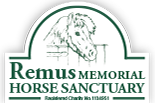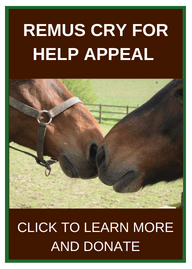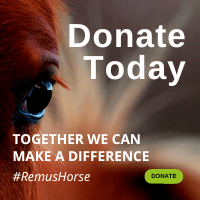

Feel-Good Shopping with Amazon
Shopping online with Amazon is pretty much everyone’s go-to nowadays, either when we need something in a hurry or can’t find it at our local shops. But did you know that Amazon will make a donation to the charity of your choice every time you shop with them? It’s easy if you use AmazonSmile.
Similar to Give as you Live, if you shop at www.smile.amazon.co.uk they’ll donate to your favourite charity at no extra cost to you. What’s more, it’s really easy to sign up!
It’s exactly the same as the standard Amazon – same products, same low prices and same level of service.
The easiest way for you to generate AmazonSmile donations for Remus is to activate AmazonSmile in the Amazon Shopping App. You can follow a screen recording of the process here. Alternatively visit the website. Once AmazonSmile is activated in the Mobile App, donations will be automatically generated on all eligible purchases.
If you’re signing up via a desktop or a laptop, please sign-up to AmazonSmile here.
Storm Eunice Update
It’s hard to believe now, but Storm Eunice hit the Sanctuary in February of this year. Following on from the devastation it heralded, we had various contractors and volunteers in attempting to fix the extensive damage. Our main concern was the broken fencing and the damaged shelters, as both of these have direct impact upon the animals’ welfare.
Following the storm, we had to move many of our horses into different fields and paddocks due to damaged and unsafe fencing that was not secure for them to stay in. Many of these paddocks we either save for summer months or are not suitable to hold horses long term and so the fencing needed to become a priority.
Additionally, a large volunteer group party came up one Sunday and proceeded to clear a lot of the damaged structures, fencing and debris, leaving big pieces in situ with the hope that they can be rebuilt where they laid. We were very grateful for the help they provided.
Over the course of the next 2 weeks, we had a fencing contractor team in to repair the broken sections of fencing, which was done swiftly and efficiently, and all the fencing is now completed.
Simultaneously we had a roofing company in to repair a skylight in the main building, tiles that had come down, an exterior floodlight that had been severely bent, roofing slates that had come off one of our buildings, and also the main electricity cable loom that had been pulled off that same building.
Work is now starting on repairing and rebuilding the shelters. The one that was in the best shape has already been completed by our handyman volunteer Jon. A new roof is being put on top of the shelter at the back of our barn from which the felting was ripped off and timber roof structures damaged, and which is now being replaced by a tin roof. Then there are still lots of smaller jobs that will require work in the next phase! Although the storm may have only lasted a short time, it has certainly left a lasting legacy on the Sanctuary.
We would like to thank everyone that has donated towards this appeal so far, and those many people who have helped physically at the Sanctuary and have allowed for this work to be completed and continue. Without your donations we would struggle to finance such a large-scale restoration and we are extremely grateful. That said there is a huge deficit in the costs and still more to do so, if you haven’t yet contributed to our appeal, we would be most grateful if you could. You can do so via the link here: www.justgiving.com/campaign/rebuild-remus-after-eunice.
Fun for the Whole Family at Remus Horse Sanctuary
Remus Horse Sanctuary will be opening its gates on Sunday 3 July to welcome members of the public for its fun Dog Show and Family Day from 1pm to 5pm. The Dog Show will commence at 2pm with bookings being taken from 1.30pm.
Special guest Buzz Lightyear will also be making an appearance during the afternoon.
The Sanctuary at Little Farm, Buttsbury, near Ingatestone, offers free parking on-site, with disabled access. Admission will be charged at just £5 per adult and £3 for children. Entry to the Dog Show is £2 per class. Cream Teas can be booked in advance for £12 per person, including entry.
The Remus novelty Dog Show includes fun classes such as: Bad Hair Day and Best Sausage Catcher, along with the more meaningful – Dogs with a Disability (blind, deaf or a life-changing illness) and of course, the ever-popular Best in Show. The 1st – 6th winner receives a rosette and best Rescue Dog and Best in Show receive a trophy to keep.
The events at the Sanctuary are always fun and interesting for the whole family, with a children’s entertainer, live music, delicious refreshments, lots of stalls, a tombola and a raffle.
The Sanctuary provides rehabilitation and care for around 200 animals, including horses, ponies, donkeys, goats, sheep and cats, and has been doing so since it was founded in 1983.
Every year the Sanctuary faces the risk of closure due to lack of funds. The Open Days are a vital source of fundraising for the charity which, due to its location on greenbelt land, can only open to the public for a limited number of days each year.
Sue says, “Our fun dog shows offer a new dimension to our Open Days and we always look forward to inviting the public to come and visit the Sanctuary and learn more about what we do.
“Young and old always have such a great time and it means we’re able to show off our facilities and our amazing animals and give people an insight into the valuable work that we do in a fun way.”
To book tickets for the Open Day and Dog Show, visit the charity’s website at: www.remussanctuary.org/events/open-day-at-the-sanctuary-july.
For anyone wishing to sponsor a dog class at the event, especially local businesses, please email: info@remussanctuary.org. For information about the Sanctuary, visit www.remussanctuary.org or contact Sue Burton on tel: 01277 356191.
The August Open Day will take place on Sunday 7 August.
Little Ted’s New Shoes
Little Ted, one of our Shetland ponies, has been struggling a lot this spring with laminitis and has been extremely sore.
Working with our Vet and Farrier we agreed to try plastic glue-on shoes on him as they have helped some of our other horses. Ted is tiny so the shoes are very small, but they have made a huge difference. Of course, like everything now, they are very expensive to have fitted, but they have given him back a quality of life and given us back our happy old fella! You can see the little shoes shown resting on his back before being fitted.
With the increased nutrition, especially sugar that the spring and summer grass brings, it causes a condition called laminitis.
Laminitis is inflammation of the laminae of the foot – the soft tissue structures that attach the pedal (pee-dal) bone of the foot to the hoof wall. The inflammation and damage to the laminae causes extreme pain and leads to instability of the pedal bone in the hoof. In more severe cases it can lead to complete separation of and rotation of the pedal bone within the hoof wall which can penetrate through the bottom of the sole. This then becomes life threatening and often results in the horse being put to sleep.
To treat this, we remove the horse from the grassy paddock or field it is on and move it to a balder paddock or woodchip area or stabled facility. Grass is then completely avoided; hay is given in its place on a strict dietary amount. Pain relief is given as required and sometimes remedial farrier work is done. The horse or pony is closely monitored over the next few weeks for signs of improvement and to ensure it’s coping with this new management structure accordingly.
The vet will be contacted and will visit if necessary. Once an animal has a laminal episode they are then prone to it for life which is why we need more woodchip paddocks so that we can provide more laminitic horses with an outside environment where they don’t have access to grass but can still be outside with their friends and see what’s going on, rather than being stuck in a stable.
Over 90% of all episodes of laminitis are brought on by endocrine disease so either Pituitary Pars Intermedia Dysfunction (PPID, previously known as Equine Cushing’s Disease) which is a complex condition associated with abnormal function of a small, hormone-producing organ, the pituitary gland, that lies at the base of the brain. Or Equine Metabolic Syndrome which is a hormonal disorder quite similar to Type 2 diabetes in humans. Laminitis and its associated issues are responsible for approximately 7% of all equine deaths.
You can see further images of Little Ted supporting some very fetching glue-on shoes which reduce the concussion on his feet whilst walking to help support his laminitis.
If you’d like to make a donation towards a new laminitic paddock, please do so here.
Enjoy a Cream Tea Fit for a Queen
Celebrate the Jubilee with Remus Horse Sanctuary and a Cream Tea on Sunday 5 June.
Remus Horse Sanctuary has pledged its support for The Big Jubilee Lunch, which will be bringing the Platinum Jubilee celebrations into the heart of every community this June. The Sanctuary will be bedecked with bunting on Sunday 5 June in celebration of HM The Queen’s Platinum Jubilee for a special celebratory Open Day.
In traditional street party-style, a sit-down Cream Tea will be served at 2.30pm, and a special commemorative tree will be planted as part of the Queen’s Green Canopy.
During the afternoon, visitors can meet the 200+ rescued and rehabilitated horses, ponies and donkeys, learn more about the Sanctuary and enjoy a singalong with guest band Midnite Blu. Whilst children can enjoy face-painting, up close magic and a very special guest – Minnie Mouse will be making an appearance.
The Cream Tea will consist of two plain scones, butter, jam and clotted cream and will be served with a choice of tea or coffee. The Cream Tea is £12 per person including entry. Entry only tickets are £5 for adults and £3 for children.
In addition to the Cream Tea, a range of delicious refreshments will also be available and there will be lots of stalls including a tombola and raffle.
Gates open at 1pm and close at 5pm. Parking is available on-site with disabled access, and dogs are very welcome on a lead. Admission will be charged at just £5 per adult and £3 for children. Advance online booking is recommended via the charity’s website.
The Sanctuary provides rehabilitation and care for around 200 animals, including horses, ponies, donkeys, goats, sheep and cats. The Open Days are a vital source of fundraising for the charity which, due to its location on greenbelt land, can only open to the public for a limited number of days each year.
Sue Burton, Founder of the Charity says, “We’re delighted to be supporting The Big Jubilee Lunch this year and hope to see many people and supporters from around Essex and beyond having fun, reconnecting and celebrating the things they care about this summer!”
For further information, visit www.remussanctuary.org or contact Sue Burton on tel: 01277 356191.
Interesting Goat Facts
A baby goat is called a ‘kid’. A castrated male goat is called a ‘wether’. An uncastrated male goat is called a ‘billy’or a ‘buck’. A female goat is called a ‘nanny’ or a ‘doe’.
Goats are sociable animals and therefore become depressed if they are separated or isolated from their companions, however they are not flock-orientated like sheep.
They are one of the cleanliest animals and are much more selective feeders than cows, sheep and pigs.
Goats are very intelligent and curious animals. Their inquisitive nature is exemplified in their constant desire to explore and investigate anything unfamiliar which they come across.
They communicate with each other by bleating. Mothers will often call to their young to ensure they stay close by. Mother and kid goats recognise each other’s calls soon after the mothers give birth.
Goats can be taught their name and to come when called.
They are very picky eaters. They have very sensitive lips, which they use to “mouth” things in search of clean and tasty food. They will often refuse to eat hay that has been walked on or lying around loose for a day.
Goats use the sneeze sound as an alarm. They use a sneeze to warn each other of danger, whether real or imagined.
They are extremely intelligent and curious and are very often not given credit for being the smart and loving creatures they actually are.
Goats dislike water and would rather leap over streams and puddles than step in them.
Visitors Welcome at Horse Sanctuary Early May Bank Holiday Weekend
The humans at Remus Horse Sanctuary are looking forward to welcoming visitors to the Sanctuary to meet the 200+ animals for the first time this year, on Sunday 1 May from 1pm to 5pm.
Parking is available on-site with disabled access, and dogs are very welcome on a lead. Admission will be charged at just £5 per adult and £3 for children. Advance online booking is recommended via the charity’s website.
The Sanctuary organises a number of Open Days throughout the summer months and dates for 2022 are as follows:
- Sunday 5 June
- Sunday 3 July with a fun dog show
- Sunday 7 August
- Sunday 4 September with a fun dog show
- Sunday 2 October
Open Days at the Sanctuary are fun for the whole family, with a children’s corner, live entertainment, and music from Midnite Blu.
A range of delicious refreshments, including gluten-free sandwiches and homemade cakes, are also available and there will be lots of stalls including a tombola and raffle.
The Sanctuary also host Afternoon Teas, the details for which can be found on the Charity’s website: www.remussanctuary.org/events.
The Sanctuary provides rehabilitation and care for around 200 animals, including horses, ponies, donkeys, goats, sheep and cats. The Open Days are a vital source of fundraising for the charity which, due to its location on greenbelt land, can only open to the public for a limited number of days each year.
Sue says, “We’re really looking forward to a better season this year. Not only have we seriously struggled since the pandemic, but then Storm Eunice wreaked havoc in February which we’re still trying to recover from.
“We’re immensely proud of what we do here, and love inviting the public to come and visit us to meet the animals and learn more about what we do.”
For further information, visit www.remussanctuary.org or contact Sue Burton on tel: 01277 356191.
Worming Our Horses – The Future
The writing is on the wall for more equine disease and death if the industry does not take urgent, cohesive action against wormer resistance.
This was the view of experts at the 30th National Equine Forum on 3 March 2022. There is evidence of resistance to all four classes of worming drug available for use on horses, and no new types or drugs expected in the near future.
Sue Burton, Founder of Remus Horse Sanctuary said: “When we started 40 years ago I remember seeing horses who looked like they were passing blood, but it was the sheer amount of red worms in the faeces. Horses died from this. With the new version of anthelmintics that came into being, this is no longer something we see. But on the horizon is resistance to existing wormers and therefore we will have nothing that will be effective against worms in our horses and could well return to those awful days.
“Years ago we would all just worm our horses every time it was necessary but now we know that we have to be more pro-active and work with faecal egg counts rather than constantly using drugs. All of Remus’ animals have faecal egg counts taken, and are only wormed when necessary, thus reducing the risk of resistance.”
British Equine Veterinary Association (BEVA) president elect David Rendle, a specialist in equine internal medicine, said: “We know traditional worming strategies mean 80% of doses are completely unnecessary, and multiple surveys show that although use of diagnostics is improving, as few as 10% of people are using them appropriately.”
Mr Rendle said in the past year in the UK, 1.13m doses of wormer were given, and 120,000 faecal egg counts carried out, so about 11 doses for each count, which is “definitely the wrong way round”.
“The writing is on the wall for more death and disease, and pastures that can’t be grazed by horses,” he said. “That will have a radical effect on our industry, and it will be in years, not decades.”
Claire Shand, managing director of Westgate Labs, which carries out parasite diagnostics, said using faecal counts can reduce wormer use by about 80%.
“There’s absolutely no place any more for routine worming,” she said. “The humble egg count is the cornerstone of testing; they’re cheap, simple and we try to make them as easy for owners to use as we can. And we use them to maintain the efficacy of the wormers we do need to give.”
Ms Shand added that appropriate dosing is also key, for horses who do need to be wormed, as not giving enough for a horse’s weight also contributes to resistance.
“All horses need good parasite control, and it’s future generations we need to do this for, so we can keep grazing horses on our fields into the future,” she said. “My question is: what will you do when the wormers stop working?”
Sue Burton said: “The horse world needs to acknowledge this threat and wake up now and deal with this problem whilst there is still time to do so, but we need to act fast. We don’t want to return to the old days and the problems that horses suffered from needlessly.”
The first stage of the project, which is supported by the BEVA was initiated as a collaboration between Tim Mair of CVS Group and Julia Shrubb and Camilla Scott of the VetPartners equine clinical board. The first step involves asking horse owners, keepers, stud and yard owners and managers, to complete an online survey on their worm-control programmes.
The surveys, for horse owners and yard/stud owners/managers, are available online via the two links.
We urge you to take part.
Make your Will for FREE
Leaving a legacy in your Will is one of the best ways of ensuring that we can continue our valuable work. As you know, we rescue horses, ponies, donkeys and more, and provide rehabilitation and respite to them and to elderly horses, and all of our work is paid for by donations and fundraising. A gift in your Will, however small or large, can help ensure we can always be here for those victims of physical and mental abuse, whether it be as a result of ignorance or malicious intent.
By making a Will you can ensure that your wishes, and the people and causes you care about, are provided for. After providing for your family and friends remembering us in your Will means that we will be able to carry on the vital work of rescue, lobbying and education. By leaving a gift to Remus Horse Sanctuary in your Will you can shape the future, ensuring that we are always here to raise a voice for animal welfare.
Remus Horse Sanctuary is committed to being there for those animals that need us – after all, they cannot speak for themselves. If you decide to leave a gift in your Will to us, you will be supporting us to make sure we continue our valuable work with animal rescue and welfare.
Every single gift is vital to Remus and we appreciate any gift you may choose to leave us. Whatever the value of your gift, it will go a long way to help an animal that needs us.
It will not cost you a penny during your lifetime. It is simple to do and is free from inheritance tax.
All gifts, whatever their size make a real difference. It truly is a gift of a lifetime.
We thank you in advance for making a generous and thoughtful contribution.
Your gift will make a lasting and positive difference to Remus Horse Sanctuary.
Click here to find out more> www.freewills.co.uk/charity/remus-sanctuary
The New Highway Code: How it Affects You and Your Horse
You might remember back in January we mentioned a review of the Highway Code. As of 29 January 2022, a number of changes to the code came into force – and it’s one step closer to making our roads safer for horses and riders. Most significantly, a new hierarchy of road users means that riders are to be considered equal to cyclists.
So what does that mean in practice? We’ve broken down some of the most important things you need to know.
- The new hierarchy of road users gives more responsibility to those who present the most risk. For example – drivers have responsibility for themselves, as well as cyclists, horse riders and pedestrians, because they present the most risk.
- Within the hierarchy, cyclist and horses riders are to be treated equally.
- Riders have responsibility for themselves, and more vulnerable road users like pedestrians.
- Other road users must pass riders at no more than 10mph, with at least 2 metres of space.
- Cyclists must not pass a horse on the left.
- Drivers should take extra care when entering a roundabout, and must not cut across riders who are continuing around the roundabout in the left hand lane.
- Horse riders should give way to pedestrians on a zebra crossing, and pedestrians and cyclists at a parallel crossing.
- Horse riders should give way to pedestrians on bridleways, or other shared use paths.
All of the above changes have been welcomed by the British Horse Society, who have been campaigning tirelessly to make the roads safer for horses and riders.
With almost 2 horses killed each week on UK roads, and that number increasing year-on-year, the new rules are aimed to protect horses and riders as vulnerable users.
You can read more about the Highway Code changes here.
As you may know, Storm Eunice raged through the Sanctuary, tearing apart field shelters, flattening fences and ripping into roofs. Please help us to rebuild.










